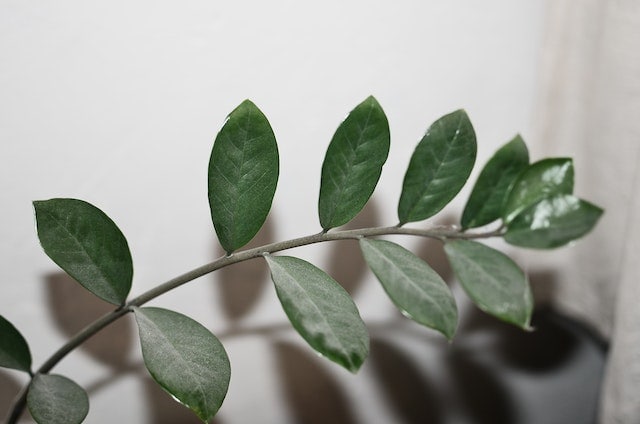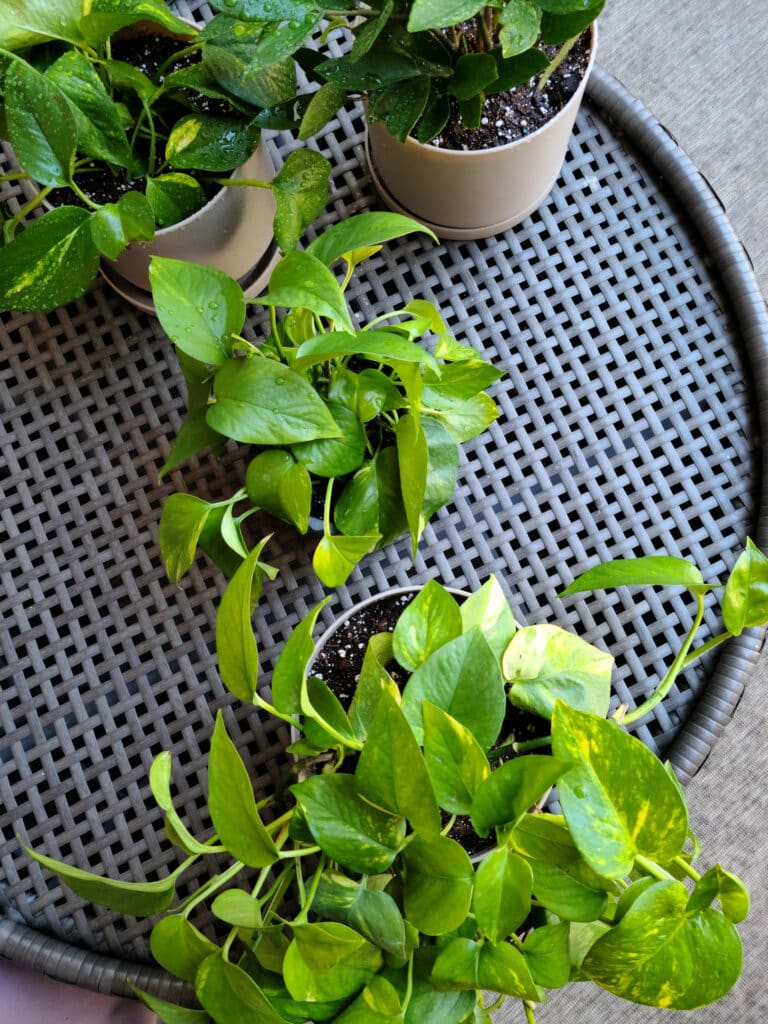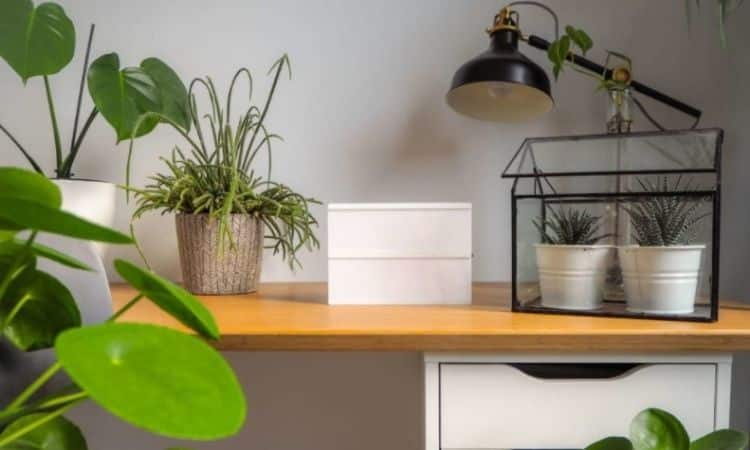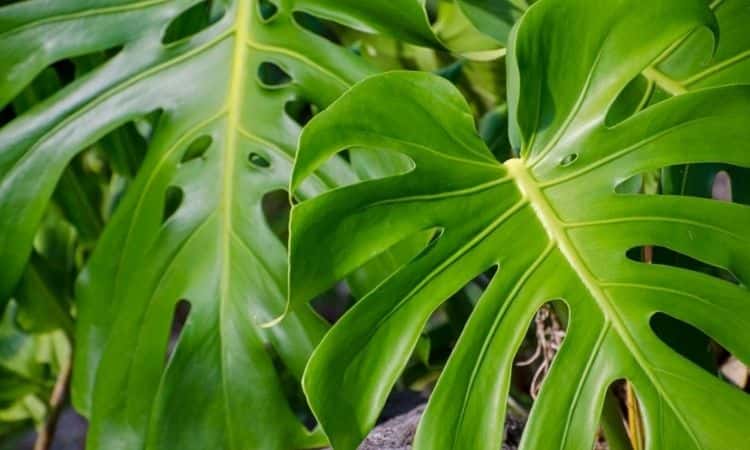Are ZZ Plants Poisonous To Dogs?
You have probably heard of the popular ZZ plant as the perfect plant for beginners. However, you have a dog and are unsure whether the two go together. Well, you have come to the right place.
In this article, we will explain everything you need to know about ZZ plants and dogs – from potential dangers to simple solutions.
What Is ZZ Plant?
Table of Contents
The ZZ plant (Zamioculcas zamiifolia) is a lovely plant from the Araceae family that is native to Africa. ZZ plants have waxy green leaves that give them a tropical appearance.
The ZZ plant is a favorite among indoor gardeners because it is a low maintenance plant that requires minimum houseplant care and is not prone to pest problems. It is drought-tolerant, and it thrives in low-light conditions.
The ZZ plant is known by many names and monikers, including emerald palm, aroid palm, eternity plant, and Zanzibar gem. Although it has been present for quite a while, the ZZ plant became popular in the early 1990s.

Is ZZ Plant Toxic To Dogs?
Yes, the ZZ plant is toxic. In fact, all parts of the plant are, and that includes foliage, roots, sap, and seeds. However, the ZZ plant toxicity is often blown out of proportion. Namely, the plant is mildly toxic, and in most cases, it causes stomach aches and eye or skin irritation.
Is ZZ Plant Toxic To Other Pets?
Yes, the ZZ plant is toxic to other pets (cats) and humans, especially small children. Once again, the results of its toxicity are digestive issues and irritation.
What Makes The ZZ Plant Poisonous?
The ZZ plant toxicity comes from its calcium oxalate crystals – sharp crystals also found in some types of kidney stones. Simply put, they are calcium salts with sharp edges.
Just like with kidney stones, the sharp edges of the calcium oxalates damage the mucus membranes they come into contact with, resulting in irritation and inflammation.
We should note that there are two types of calcium oxalates – insoluble and soluble. The calcium oxalates found in ZZ plants are of the insoluble kind (they are not absorbed into the dog’s body).
You might also like Mirabelle Plum Trees Everything about planting, cutting & harvesting
Are Calcium Oxalate Crystals Unique To ZZ Plants?
No, calcium oxalate crystals are not unique to ZZ plants. In fact, they can be found in many plants.
Insoluble oxalate crystals are present in pothos, philodendrons, peace lily plants, devil’s ivy, umbrella plants, elephant’s ears, calla lilies, dumbcanes, arrowhead vines, hunter’s robes, etc.
Soluble calcium salts are found in garden rhubarbs, starfruits, and shamrock plants. These plants are more poisonous to pets than the ones containing insoluble oxalate crystals.
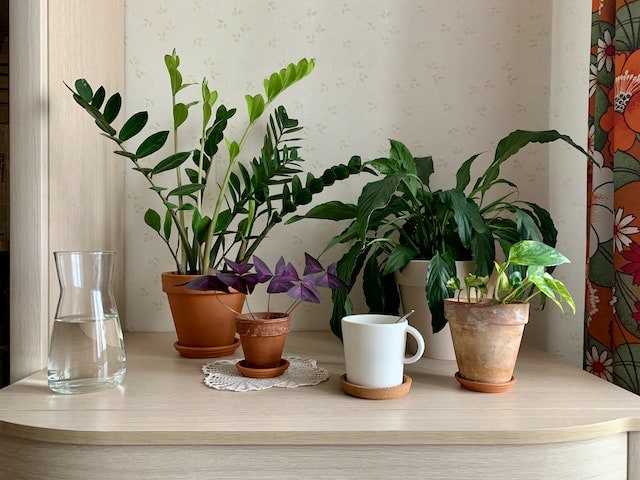
What Are The Symptoms Of ZZ Plant Intoxication In Dogs?
The symptoms of ZZ poisoning depend on the ingested amount. In small quantities, the ZZ plant causes oral irritation. In larger amounts, it results in stomach ache. If your dog ingested ZZ plants, you can expect the following symptoms:
- Increased drooling (hypersalivation)
- Pawing at the mouth
- Swelling of the lips and tongue
- Vomiting and nausea
- Loss of appetite (anorexia)
In severe but rare cases, the swelling may affect the larynx and result in impaired breathing. However, this is not a common scenario.
The ZZ plant does not have to be ingested to cause problems. Namely, direct contact with it can also trigger irritation to sensitive areas – eyes, mucus membranes, and non-hairy parts of the body.
The skin irritation caused by ZZ plants is similar to that of a skin allergic reaction, resulting in a painful and burning sensation. Similarly, eye irritation is followed by pain and temporary photophobia (light sensitivity).

How Is ZZ Plant Poisoning In Dogs Treated?
The treatment depends on how much your dog ingested or, in the case of contact reaction, the severity of the eye or skin irritation. More often than not, these reactions will be mild and can be managed at home.
If your dog ate ZZ plants, make it drink lots of water to flush out the sharp crystals and avoid further damage. It is also advisable to give your dog something tasty to wash the taste. We suggest offering chicken/beef broth, tuna juice, or milk/yogurt.
In the situation of eye or skin contact, flush the affected area with copious amounts of clean water. Once again, the concept is the same – to eliminate the crystals and stop irritation.
These are helpful first-aid tips. However, if your dog’s symptoms do not subside in a few hours, we suggest calling your trusted veterinarian.
What Happens At The Vet’s Office?
If a few hours have passed and your dog’s condition is not improving, the vet will initiate treatment. Here is a closer look at the treatment approach.
Anti-Emetics: This refers to a group of medications used to stop vomiting. They are given in severe cases, as vomiting is uncomfortable and drains the dog’s body.
Intravenous Fluids: Intravenous fluids are considered if the vomiting weakens or dehydrates the dog. They will refresh the dog and speed up the recovery process.
Pain Control: On rare occasions, if the irritation is intense and the dog is in pain, the vet might give anti-pain meds. Usually, a single dose will be enough.

You Might Also Like Zee Zee Plant Toxic
How To Prevent ZZ Plant Poisoning In My Dog?
Obviously, the best way of preventing ZZ plant issues in pets is not to keep them in the house. However, if you consider the ZZ to be the perfect plant for you and want it, do not worry. There is a way of growing a ZZ plant safely around pets.
Here is what you can do to keep your pets safe while having a ZZ plant in the house.
Protection: Always wear gloves when handling ZZ plants, and always wash your hands afterward, especially if petting your dog.
Strong Odors: Sprinkle orange peels or coffee grounds around the ZZ plant pot, as strong scents will deter your dog You can also spray a vinegar solution on the ZZ plant, but the residual odor can be too strong, even for you.
Education: Inform children and other humans in the household about the potential dangers of ZZ plants for furry friends.
You might also like Growing Batavian Lettuce
What Plants I Can Keep If I Have A Dog?
There are other plants you can keep if you have pets. Some of them require indirect light, others direct sunlight, and there are those that thrive in low-light conditions. Either way, they are pet-friendly and safe to keep.
What Indoor Plants Are Safe For Cats, Dogs & Other Pets?
Indoor plant options that are safe for pets include parlor palm, rattlesnake plant, spider plant, ponytail palm, African violet, bird’s nest fern, Venus flytrap, staghorn fern, baby tears, prayer plant, friendship plant, bromeliad, polka dot plant, watermelon peperomia, and orchid.
You Might Like How To Make A Spider Plant Bushier
What Outside Plants Are Safe For cats Cats, Dogs & Other Pets?
Popular pet-friendly outdoor plant options include asters, camellias, sunflowers, inpatients, creeping thyme, fuchsias, snapdragons, roses, dill, purple basil plant, magnolia bushes, coral bells, rosemary, marigold plants, fennel, and calendulas.
Conclusion: Is ZZ Plant Poisonous And What To Do?
All in all, the ZZ plant (Zamioculcas zamiifolia) is a wonderful addition to indoor gardens. Plus, it is a great plant for people with low gardening skills, as it is low maintenance, meaning it does not need special houseplant care.
However, ZZs are poisonous plants that cause irritation in pets and children. Luckily, the toxic effects of ZZ plants are not life-threatening, and in most cases, the symptoms can be managed at home.
Anyway, if your dog ingested a significant amount of ZZ plant and is experiencing severe symptoms, call your vet immediately. You can also contact Animal Poison Control for first aid tips.
You might also like How Often Should You Water Hydrangeas
FAQs
What Happens If Your Dog Eats ZZ Plant?
If your dog ingests the ZZ plant, it will experience irritation of the mouth, followed by symptoms like drooling, vomiting, and diarrhea.
The ZZ plant can also cause eye and skin irritation. Basically, all mucous membranes that come into contact with the ZZ plant sap can develop inflammation.
How Toxic Is ZZ Plant?
The ZZ plant is moderately toxic. In fact, its toxicity comes down to irritation rather than real poisoning, meaning it does not cause significant harm.
However, people handling ZZ plants are still advised to wear gloves, and the plant should be kept out of reach of pets and children.
Can The ZZ Plant Toxic Effects Cause Cancer?
No, the ZZ plant cannot cause cancer – this was a popular opinion that took the internet by storm a decade ago. Today, we know that ZZ plants are not in any way associated with cancer in cats, dogs, or humans.
What Are The Most Poisonous Houseplants For Dogs?
Other plants considered toxic to dogs are calla lily, aloe, holly, begonia, daffodil, devil’s ivy, philodendron, elephant’s ear, fern palm, pothos, hortensia, jade plant, marble queen, mistletoe, mother-in-law plant, nightshade, etc.
